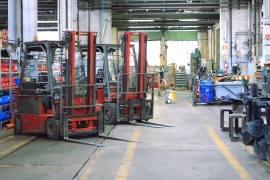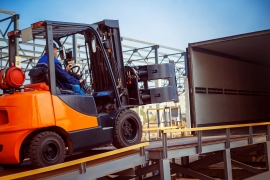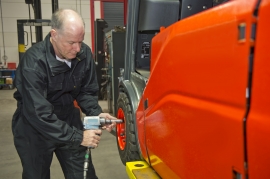
Efficient material handling is paramount in meeting tight production schedules and increasing profitability. Businesses that rely on warehouses and distribution centers require a fleet of reliable material-handling equipment to streamline their operations. One of the most popular and dependable options is the Internal Combustion (IC) forklift. This blog post will discuss how IC forklifts can optimize material handling operations and provide a comprehensive overview of their advantages, applications, and maintenance requirements.
1. Advantages of IC Forklifts
An internal combustion engine forklift or IC forklift comes equipped with an engine that runs on various fuels, from propane to gasoline, diesel, and natural gas. This versatility allows them to perform heavy-duty tasks in varying weather and temperature conditions. Especially in humid countries like Singapore, IC forklifts are more suitable than electric forklifts or pallet stackers. Here are some advantages of using IC forklifts for your material handling needs:
a. Higher load capacity than electric forklifts
Many IC forklifts can lift heavier loads than electric forklifts, making them ideal for larger warehouses and outdoor applications. They are more powerful than their electric counterparts and can be used in applications that require greater lifting capacities.
b. Longer operational time
IC forklifts have a longer operational time than electric forklifts, typically up to 8 hours on a single fuel tank. This makes them ideal for warehouses or job sites that require long hours of operation.
c. No recharging required
Unlike electric forklifts, IC forklifts don’t need recharging, which can be time-consuming. This can help eliminate downtime and increase efficiency for your business.
d. Low maintenance costs
IC forklifts have lower maintenance costs than electric models, as they don’t require regular battery replacements or servicing. This leads to lower operational costs, making them a cost-effective choice for material handling operations.
2. Applications of IC Forklifts
IC forklifts are ideal for various indoor and outdoor material handling applications. Their rugged design makes them a popular choice for construction, agriculture, and manufacturing industries. Here are some typical applications of IC forklifts:
a. Loading and unloading cargo from trucks and trailers
Most IC forklifts come equipped with a clamp attachment that can be used to load and unload cargo from trucks and trailers quickly. This makes them perfect for material handling operations that require fast loading and unloading.

b. Moving heavy materials
IC forklifts are powerful enough to move heavy materials such as pallets, crates, and barrels. This makes them ideal for warehouses and distribution centers that require heavy lifting and transport of materials. They can also move large objects such as machinery and furniture.
c. Outdoor applications
Although electric forklifts are better for indoor applications, IC forklifts can also be used for outdoor operations. Their engines can withstand harsh weather conditions and are more reliable than electric models in extreme temperatures. This makes them the ideal choice for warehouses located in tropical countries.

3. Maintenance Requirements for IC Forklifts
Routine maintenance is critical to keep your IC forklifts running smoothly and efficiently. This includes regular engine oil changes, tire rotation, brake inspections, general cleaning, and lubrication. Failure to perform routine maintenance can lead to decreased performance, increased fuel consumption, and costly repairs.
Always follow the manufacturer’s recommended maintenance schedule to keep the vehicle in good condition. This includes regularly changing the fuel filter, spark plugs, and air filter. It’s also important to check for any loose or damaged components and replace them as necessary. This will ensure that your IC forklift runs efficiently and safely for years.
4. Choosing the Right IC Forklift for Your Business
When considering purchasing an IC forklift, there are several factors to consider, including load capacity, lift height, fuel type, and budget. A reputable forklift dealer can help guide you through the process and recommend the right model based on your specific material handling needs. Look for a supplier that offers comprehensive after-sales service and support. This will ensure that your IC forklift is regularly serviced and maintained for optimal performance.
IC forklifts can optimize material handling operations with their versatility, durability, and fuel efficiency. They offer various advantages that make them suitable for various applications, from loading and unloading cargo to moving heavy materials. However, it’s crucial to ensure that your IC forklift is regularly maintained and serviced for optimal performance. With the right IC forklift, you can streamline your material handling operations and increase efficiency in your business.

Be the first to comment on "Optimizing Material Handling with the Power of Internal Combustion Engine Forklifts"